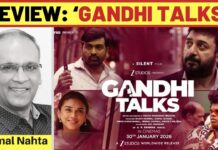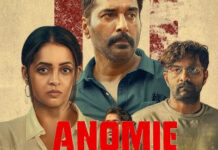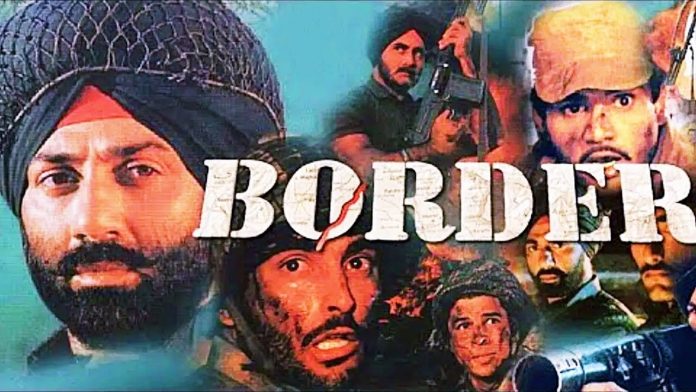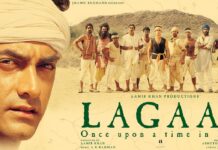CLASSIFICATION: 1997
(Total 120 films, including 28 dubbed films)
AAA
(Super-Duper Hit)
BORDER
AA
(Super Hit)
DIL TO PAGAL HAI (‘AAA’ in Bombay, East Punjab & West Bengal)
A1
JUDAAI
HERO NO. 1
ZIDDI
A
VIRASAT (‘A1’ in Bombay)
ISHQ
CHACHI 420 (‘AA’ in Bombay, C.P. Berar)
BB
PARDES (‘A1’ in Bombay)
DEEWANA MASTANA (‘A1’ in Bombay)
JUDWAA (‘A’ in Bombay)
YESHWANT (‘A’ in Bombay)
ANACONDA (dubbed)
B1 to BB
GUPT (‘A1’ in Bombay & Tamilnadu-Kerala; average in some circuits)
BHAI (‘A’ in Delhi-U.P.)
ASTHA
B1
JODIDAR
THE LOST WORLD: JURASSIC PARK (dubbed)
B to B1
YES BOSS (‘A’ in Bombay & Nizam)
KAALIA
JUDGE MUJRIM
QAHAR
SHAPATH
KOYLA (‘BB’ in Nizam)
AUZAAR (‘BB’ in Nizam)
DAADAGIRI
B
CHUDAIL (‘BB’ in some circuits)
SURAJ
GHULAM-E-MUSTHAFA (‘BB’ in Bombay & C.P. Berar)
THE REST
……….
AT A GLANCE

FILM INFORMATION’S
Bests Of 1997
Best Film
BORDER
Best Producer
J.P. DUTTA
(BORDER)
Best Director
PRIYADARSHAN
(VIRASAT)
Best Actor
KAMAL HAASAN
(CHACHI 420)
Best Actress
TABU
(VIRASAT)
Best Character Actor
AMRISH PURI
(VIRASAT)
Special Award
KIRON KHER
(DARMIYAAN & SARDARI BEGUM)
Best Villain
ASHISH VIDYARTHI
(ZIDDI)
Best Comedian
OM PURI
(CHACHI 420)
Best Story
KAMAL HAASAN
(VIRASAT)
Best Screenplay
KAMAL HAASAN
(CHACHI 420)
Best Dialogues
GULZAR
(CHACHI 420)
Best Music Director
UTTAM SINGH
(DIL TO PAGAL HAI)
Best Lyricist
JAVED AKHTAR
(‘Sandese Aate Hain‘ – BORDER)
Best Song
SANDESE AATE HAIN
(BORDER)
Best Background Music
VIJU SHAH
(GUPT)
Best Choreographer
SHIAMAK DAVAR
(DIL TO PAGAL HAI)
Best Playback Singer (Male)
UDIT NARAYAN
(DIL TO PAGAL HAI)
Best Playback Singer (Female)
LATA MANGESHKAR
(DIL TO PAGAL HAI)
Best Editor
N.P. SATISH
(CHACHI 420)
Best Action Director
TINNU VERMA
(ZIDDI)
Best Cinematographer
K. RAVICHANDRAN
(VIRASAT)
Best Art Director
BIJON DASGUPTA
(GUPT)
Best Male Newcomer
AKSHAYE KHANNA
Best Female Newcomer
AISHWARYA RAI
Film Weather: 1997
120 RELEASES
A total of 120 films were released in 1997, of which 28 were dubbed. As compared to this, 125 films (96 original and 29 dubbed) were released in 1996.
HIT & MISSES
Of the 120 films released, 18 proved successful — including hits, super-hits, blockbusters and above average. Another 11 were average or just about earners, and the remaining proved either losers, flops, debacles or disasters.
WHITHER PUBLICITY
Film publicity acquired gigantic dimensions. There was an emergence of vinyl (back-lit) displays and surfeit of promos on satellite channels to serve as potential boosters. The publicity costs zoomed from Rs. 10-15 lakh to even a crore for the big ones. They were all worth the expenses if the film clicked. But if it didn’t, the publicity just proved sasti murgi mahenga masala as in the case of Daud and Mr. & Mrs. Khiladi.
SUCCESSES ALL
The biggest hit of the year was J.P. Dutta’s Border, followed by Yash Chopra’s Dil To Pagal Hai. Judaai, Hero No. 1, Ishq, Ziddi, Deewana Mastana, Judwaa, Virasat, Pardes, Chachi 420 and Yeshwant were the other notable successes of 1997, ranging from hit to overflow.
AUTONOMY TO DD, AIR
The United Front government granted autonomy to Doordarshan and All India Radio by constituting the Prasar Bharati Board on 23rd November by issuing an ordinance. The Board has ten members with Nikhil Chakravarty being its chairman and S.S. Gill, the chief executive officer. The constitution of the Board has not been ratified by Parliament as it was dissolved before the ratification could take place. Thus, the fate of the Board, which has already started working actively to give a new life to DD and AIR, itself hangs in balance.
BOOST TO MARATHI FILMS
The Maharashtra revenue minister, Narayan Rane, granted 100% exemption from entertainment tax to Marathi films. Subsidy to Marathi films was also increased during the year.
COME FRIDAY
Distributors of C.I. decided to release new films on Fridays instead of on Thursdays in deference to the CCCA’s directive. Distributors of C.P. Berar have been given an option to release their films either on Thursdays or on Fridays.
NEW FILMLAND MPs
Shabana Azmi and Mrinal Sen were two film personalities who made it to Parliament in 1997. The industry can hope for some governmental support with two more representatives in the Rajya Sabha now.
MISERABLE CRISIS
A pall of gloom was cast on the industry after the heinous murder of Gulshan Kumar in August. Added to the gloomy atmosphere was the threatening telephone calls received by many industry people from extortionists and the underworld. This made finance so dear that film shootings dropped down by over 50%. Financiers simply did not show interest in being associated with film projects, and the industry faced the worst ever crisis in many, many years. Studio floors wore a deserted look, recording rooms were silent for days together, artistes, who had no time to eat and sleep, found themselves sitting at home or holidaying abroad, busybee choreographers had no one to dance to their steps, action directors had forgotten, so to say, how to fight, equipment hirers found their otherwise money-making equipments a burden, paint and property suppliers found that they had nobody coming to them. In short, the film industry was almost paralysed.
Added to this was the spate of flops in August, September and October. And since the prices of films, which bombed, were high, the losses too were very big. For this reason too, the rotation of money, in a way, stopped.
Things started looking up only in November and December as shootings and recordings gained momentum and Dil To Pagal Hai and Ishq also clicked.
THE NEW BRIGADE
Five new faces made a mark on the film firmament in 1997. Akshaye Khanna’s was the most sensational debut in many years, in dad Vinod Khanna’s maiden production venture, Himalay Putra. Although the film did not do well, Akshaye was hailed as a star. In the super-hit Border, he was loved, and in Mohabbat, he was again immensely liked even though the film itself did not make it. Aishwarya Rai mesmerised the audience with her beauty, and proved that talent can also go hand-in-hand with beauty, in …Aur Pyar Ho Gaya. The film, however, flopped. Mahima Chaudhary came out a winner with a promising performance in Subhash Ghai’s Pardes, and so did Apoorva Agnihotri in the same film. Pooja Batra made a flying start in the all-round successful Virasat but didn’t impress half as much in her next two films, Vishwa Vidhaata and Bhai.
PRICES STABILISING
Although much has been said and written about film prices as well as star prices, it is, perhaps, for the first time in so many years that both, producers and stars, have woken up to the need to rationalise the price structures of films as well as themselves (stars). In this, it is the distributors who have played a good role by refusing to run after proposals priced crazily. They have shown restraint and, therefore, prices of films, generally speaking, have at least stabilised in the recent past. Stars also have stopped hiking their prices after every hit.
The Central Circuit Cine Association, the strongest body in the film industry, has even gone to the extent of fixing an upper limit on film prices, for its members and their circuits viz. C.P., C.I. and Rajasthan. Of course, although this price ceiling has no chance of succeeding due to two reasons — one, the upper limit is unrealistically low, and two, buying and selling is a free trade and cannot be restricted — the ceiling, nevertheless, is a pointer to the fact that film pricing has become as unrealistic as it could.
BACHCHANS BACK
1997 marked the comeback of Amitabh Bachchan (Mrityudaata was released this year). Jaya too staged a comeback with Govind Nihalani’s Hazaar Chaurasi Ki Maa which is yet to be commercially released.
CENSOR CENSURE
The censors were as usual hard to please but were a little liberal this year. Yet, there were some Hindi feature films which had a difficult time before they could pass through. Purna Satya, Bhai, Dhaal and Train To Pakistan managed to be cleared through the Film Certification Appellate Tribunal although after a lot of deliberations.
Mira Nair’s Kama Sutra: A Tale Of Love was offered ‘A’ certificate with as many as eight cuts which were not accepted by the producer. The producer moved court and it was cleared.
AWARD WINNERS
Bappi Lahiri’s Bengali film, Lal Darja, bagged the National Award (Swarn Kamal) for the best film. Kamal Haasan and Tabu won the National Awards for the best actor and actress for their roles in Indian (Tamil) and Maachis respectively. Sivaji Ganesan was awarded the prestigious Dadasaheb Phalke award.
For the first time, an India actor, Dilip Kumar, was named the recipient of the Pakistan government’s ‘Nishan-E-Imtiaz’ award. Lata Mangeshkar won the Rajiv Gandhi National Sadbhavana award as well as the Maharashtra Bhushan award of the Maharashtra government. B.R. Chopra received the Pearl award for lifetime achievement, at the first East Asian Film & Festival held in Malaysia.
COULD NOT MAKE IT
The year also saw many a heartbreak and many distributors also breaking their backs. Debacles and disasters were many in number but what was more astonishing than the quantity of flops were the magnitude of losses in each of the flops and debacles. Prices of films were sky-high and when such films bombed, the losses were, obviously, nerve-shattering. Among the major and notable flops of the year that went by were …Aur Pyar Ho Gaya, Hameshaa, Ghoonghat, Lav Kush, Himalay Putra, Mrityudaata, Salma Pe Dil Aagaya, Daud, Lahoo Ke Do Rang, Insaaf, Mr. & Mrs. Khiladi, Itihaas, Kaun Sachcha Kaun Jhootha, Sapnay, Aar Ya Paar, Mere Sapno Ki Rani, Betaabi, Vishwa Vidhaata, Udaan, Aflatoon, Daava and Zameer. Many of these films were high-priced and some were even astronomically priced!
BLOW HOT BLOW COLD
The Overseas market turned a haven for big star-cast films, as proved by the runaway successes of films like Dil To Pagal Hai, Judaai, Koyla, Ishq, Gupt and Pardes. But it turned otherwise for the ‘smallies’.
YEAR OF TRAGEDIES
1997 was a tragic year for the industry. No year has witnessed so many tragedies as the year gone by. On 13th June, the day of release of Border, a massive fire broke out at Uphaar cinema in New Delhi, which was screening the film. A total of 49 people died, and it raised a whole controversy of safety regulations in cinema halls. Licences of several cinemas, mostly in the capital city, were suspended after this catastrophe, for violation of safety rules and regulations. On 12th August, Gulshan Kumar was gunned down, and music director Nadeem has been named the prime suspect in the case. Nadeem was and is still in London, and proceedings to extradite him are on. Ramesh Taurani has also been arrested in the same case.
Extortionists made attempts on the lives of Rajiv Rai and Subhash Ghai but, fortunately, both had Providential escapes.
IMPORT VALUE
Dubbed films usually meant films dubbed from films of South Indian languages until a couple of years back. But the scenario has undergone a drastic change now. Out of 28 dubbed films released in 1997, over 50% were dubbed versions of English films. But only two of them clicked, viz. Anaconda and The Lost World: Jurassic Park, both of which had creatures to provide the chills and thrills. So, the success ratio has hardly been 15 per cent.
FILM FESTIVALS
The 28th International Film Festival of India in Thiruvanathapuram from January 10 to 20, 1997, was boycotted by the film industry because of the controversy in the selection of the chief guest for the festival. A kind of parallel Panorama was also held by Amol Palekar, Gulzar and Aparna Sen there, and their films — Daayra, Maachis and Yugant — were screened.
Bombay’s first festival, called Festival Of Films, Mumbai, was held from November 24 to 30 at Chavan Auditorium and Tata Theatre in Bombay. Dev Anand received a lifetime achievement award at this Festival, and filmmaker Adoor Gopalakrishnan was honoured for completing 25 years in the film industry on his own terms. FIPRESCI awards were started in India in this festival, and the first two recipients for the best films were Adoor Gopalakrishnan’s Kathapurushan (Malayalam) and Rituparno Ghosh’s Dahan (Bengali).
STATE OF CINEMAS
With the installation of ultra modern acoustics such as DTS Dolby, Ultra and digital sound, the maintenance of cinemas improved vastly all over. In the days to come, many small-capacity cinemas will come up with state-of-the-art technology. One such cinema, Cinemax, opened at Goregaon, Bombay in December ’97.
DELIVERY TRAUMA
The tables turned against producers in 1997 when distributors in several cases simply refused to take deliveries of the films at the time of release. For some years before this, it was the distributor who had to succumb to pressures at the eleventh hour and hike the price at the time of delivery. But the cases of Insaaf, Mr. & Mrs. Khiladi, Mohabbat and Hameshaa in 1997 were different. At least one or more distributor(s) of these films put his/their foot down and opted for not taking delivery rather than taking it at an enhanced price or even at the contracted price.
ENT. TAX DRAMA IN MAHARASHTRA
Act 1: Cinemas in Maharashtra closed down ‘indefinitely’ from Jan. 1, 1997 in protest against the state government’s failure to continue the concession of 50% entertainment tax beyond 31st December, 1996. The call for the bandh was given jointly by CEAI, the TOA, the CCCA, the IMPDA and the Kinematograph Renters Society (KRS) after the tax rate was increased to 100%.
Act 2: The cinemas reopened on January 30/31 following an unconditional withdrawal of the bandh by the action committee of the film industry. The government promised reliefs from April 1.
Act 3: The revised tax rate came into effect from May 1 following a promulgation of an Ordinance signed by the governor. The new tax rate was scaled down to 60% from the earlier 100%.
NO MORE
The year saw some really noteworthy names depart from this world. Among those who died were Chetan Anand, Gulshan Kumar, Mukul S. Anand, Basu Bhattacharya, Anjaan, Indeevar, R.R. Khajanchi, Mukesh Duggal, Nusrat Fateh Ali Khan, Krishnan (of the Krishnan-Panju director duo), Anoop Kumar, Urmila Bhatt, Mehtab, Murad, Ranjitraaj, Chandu Parkhi, Narayan Rajgor, Chandrakant Sangani and Yeshwant Dutt.
YOU ASKED IT
With so many shootings having been cancelled after August ’97, is there a likelihood of the flow of releases in 1998 being affected?
– Definitely. There will be fewer releases in the latter part of 1998 because the progress of films has slowed down following the cancellations of shootings.
Why have more and more producers started shooting their songs abroad?
– For one, film budgets today are much higher and so are profit margins. And when margins are so high, producers don’t mind spending heavily to add gloss to their films because they are, after all, spending part of their profits. Besides, a lot of work is done a lot faster in foreign schedules, where there’s no disturbance.
Aren’t more comedy films being made now than, say, four or five years ago?
– Yes, because comedies are now universally accepted rather than in a circuit or two (like Bombay and South), some years back.
3-E
Education-Entertainment-Enlightenment
Accent On Non-Action
Action took a backseat in the films that proved successful in 1997. Light entertainers or love stories made it at the box-office more than action films. As against Border and Ziddi, there were at least eight successes/hits/super-hits that either had no action or very limited of it. Dil To Pagal Hai, Judaai, Ishq, Hero No. 1, Deewana Mastana and Chachi 420 were all devoid of action. Pardes and Gupt had action but not too much of it. Yeshwant had a fairly good dose of fiery dialogues and action. All of which means that action is not the only thing which sells.
‘Major’ Change
With ABCL’s Major Saab, director Tinnu Anand has decided to effect a major change. And the change is not pertaining to the film’s shooting (or reshooting, as is the buzz in the rumour mills). The actor-director has now decided to call himself Virender Raaj Anand! By the way, there will now be two Raaj Anands in the credits of the film: director Virender Raaj Anand and music director Anand Raaj Anand.





























